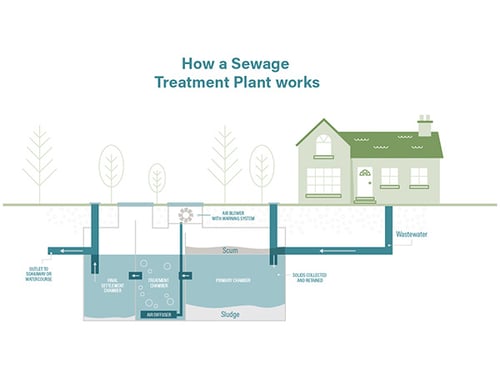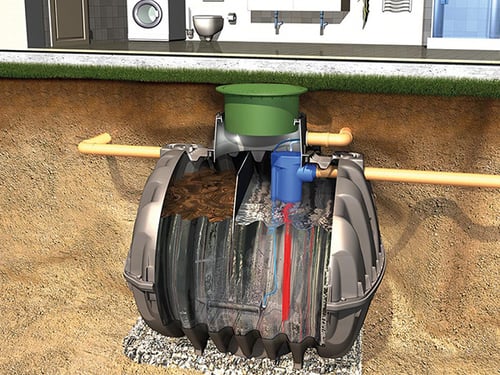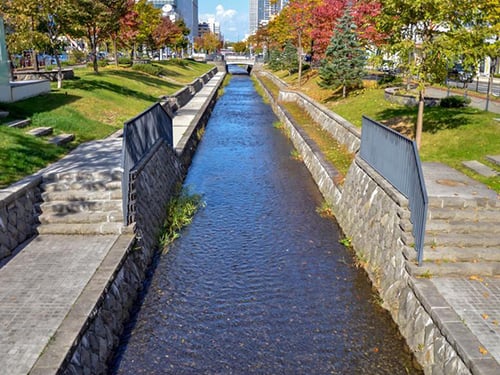Amidst rapid population growth and development in large cities, one of the environmental challenges often faced is the management of domestic wastewater. The phenomenon of rapid urbanization has resulted in a significant increase in wastewater production, raising various environmental and health issues. Wastewater treatment is not just about keeping clean, but also about protecting ecosystems and public health. With increased awareness of these issues, domestic wastewater treatment is becoming a critical component in efforts to create a sustainable urban environment.
This problem is further compounded by the limited wastewater treatment infrastructure in many cities. Outdated and inefficient sewer systems often lead to water and soil pollution, negatively impacting aquatic life and human health. In addition, climate change and extreme weather phenomena such as flooding can worsen the situation by accelerating the spread of pollutants and pathogens from poorly managed wastewater. Therefore, the development and implementation of effective and sustainable wastewater treatment methods is of great importance.
In this context, modern technologies and innovative approaches in wastewater treatment can play an important role. By using more advanced and environmentally friendly technologies, cities can manage wastewater more effectively, reduce negative impacts on the environment, and improve the quality of life of their citizens. These initiatives are not only important for maintaining cleanliness and health, but are also essential in maintaining the sustainability of water resources for future generations.

What is Household Wastewater Treatment?
Household wastewater comes from various sources, such as the kitchen, bathroom, and laundry. In their daily activities, from washing dishes to bathing, every household produces wastewater that can vary in composition. This water contains various substances, ranging from detergents and soaps to organic waste such as food scraps and human feces. This content, if not managed properly, can have serious consequences for the environment and human health.
Without proper treatment, this wastewater can contaminate clean water sources and become a source of disease. For example, nutrients such as nitrogen and phosphorus from wastewater can cause eutrophication in waters, resulting in algae overgrowth that reduces oxygen in the water and harms aquatic life. In addition, untreated wastewater can become a breeding ground for pathogens and disease-causing microorganisms, such as E.coli bacteria and viruses.
Household wastewater treatment, therefore, involves a series of processes to reduce pollution and make the water safe for discharge or reuse. This process generally includes several stages, ranging from initial filtration to remove large particles, biological treatment to break down organic matter, to advanced processes such as disinfection to kill harmful microorganisms. In some systems, treated wastewater can even be further treated for reuse, for example for irrigation or even as clean water, by utilizing advanced technologies such as membrane filtration and reverse osmosis.
By understanding what household wastewater treatment is and the importance of this process, we can better appreciate the efforts made to safeguard public health and environmental sustainability.

Household Wastewater Treatment Technology
With the development of technology, wastewater treatment methods are also constantly evolving. Innovations in this field not only improve the effectiveness of wastewater treatment but also contribute to more sustainable environmental management. Some of the latest technologies include biofilter systems, anaerobic treatment, and membrane technology.
Biofilter systems utilize natural microorganisms to break down organic matter in wastewater. It is an environmentally friendly method as it reduces the need for the use of chemicals. Additionally, biofilter systems require a relatively small amount of space, making them ideal for use in urban areas with limited land.
Anaerobic treatment utilizes natural microorganisms to break down organic matter in wastewater.
Anaerobic digestion, on the other hand, is a process that breaks down organic matter in conditions without oxygen. This method is effective in reducing the amount of solid waste and produces biogas, which can be used as a renewable energy source. This not only helps reduce operational costs but also reduces the carbon footprint of the wastewater treatment process.
Membrane technologies, including reverse osmosis and ultrafiltration, are becoming increasingly popular due to their ability to filter out contaminants at a microscopic level. These technologies can produce water that is extremely clean and safe to discharge or even reuse. Although the initial cost can be high, membrane technology offers high efficiency and reliability, making it a worthwhile long-term investment.
In addition to the technologies mentioned, there have also been advancements in modular and small-scale wastewater treatment systems designed for easy installation and low maintenance. These innovations are particularly useful for small communities or remote areas that do not have access to large wastewater treatment facilities.
.
By adopting these advanced technologies, household wastewater treatment not only becomes more efficient but also more environmentally friendly, helping to create more sustainable and healthy cities.

Benefits of Wastewater Treatment for Urban Environment
Wastewater treatment has a number of important benefits, especially in the context of urban environments. These benefits include not only environmental aspects but also public health and economic sustainability. One of the main benefits is the reduction in the risk of pollution of clean water, which is a vital resource for city life. By reducing the amount of pollutants entering water sources, wastewater treatment helps maintain the safety and quality of water resources available to city dwellers.
In addition, wastewater treatment also contributes to the reduction of greenhouse gas emissions. Uncontrolled decomposition of organic waste often produces methane, a highly potent greenhouse gas. By managing this waste in a controlled environment, methane production can be minimized, which in turn helps to reduce the impact of climate change.
Other benefits include improved quality of life for all.
Other benefits include improved quality of life and public health. Improperly treated wastewater can be a source of disease, spreading pathogens and harmful pollutants. Effective wastewater treatment reduces the risk of spreading these diseases, providing a healthier environment for city dwellers.
In addition, there are also other benefits including improved quality of life and public health.
In addition, there are also economic benefits of efficient wastewater treatment. By reducing the costs associated with the health and environmental impacts of untreated wastewater, as well as by utilizing byproducts such as biogas, cities can experience significant cost savings. It also opens up opportunities for a circular economy, where waste is converted into resources, providing additional economic value.
Finally, effective wastewater treatment also supports sustainable growth in cities. By ensuring that sanitation infrastructure and services evolve with population growth, cities can avoid the negative environmental and health impacts that often result from uncontrolled urbanization.

Challenges and Solutions in Household Wastewater Treatment
Despite its importance, domestic wastewater treatment in urban environments faces a number of challenges. Key challenges include limited land to construct treatment facilities, the complexity of effluents due to the variety of sources, as well as budgetary constraints that often affect the ability of municipalities to improve sanitation infrastructure.
Limited land in cities means that municipalities are unable to build treatment facilities.
Land constraints in large cities are a significant issue as they limit options for the construction of large-scale wastewater treatment facilities. This often requires creative approaches in facility design, such as the construction of vertical wastewater treatment facilities or the integration of facilities under public spaces such as parks and sports fields.
The complexity of sewage, which varies from household to household and from industry to industry, creates challenges in the selection of appropriate treatment methods. To overcome this, a treatment system that is flexible and capable of adapting to different types of effluents is required.
In addition, other challenges include public awareness and participation regarding wastewater management. Education and awareness campaigns can play an important role in improving people's understanding of the importance of wastewater treatment and how they can contribute, for example through reducing the use of hazardous chemicals at home.
Solutions to these challenges include adopting the adoption of appropriate wastewater treatment methods.
Solutions to these challenges include the adoption of more compact and efficient wastewater treatment technologies, which can be placed in areas with limited space and require lower operational costs. In addition, sewage management that is more integrated with the city's sanitation system, including the use of decentralized and modular systems, can provide a more flexible and scalable solution.
The use of advanced technologies such as sensors and sensors, which can be deployed in areas with limited space and require lower operational costs.
The use of advanced technologies such as smart sensors and automated control systems can also improve the efficiency of wastewater management by monitoring and regulating the treatment process in real-time, ensuring the quality of treated wastewater is in line with set standards.
Through innovative and collaborative approaches, cities can address these challenges and ensure that domestic wastewater treatment is carried out in an efficient, effective, and sustainable manner.

Conclusion
Domestic wastewater treatment is an important component in maintaining the health and sustainability of the urban environment. Through the adoption of appropriate technologies and active participation from the community, we can ensure that wastewater is managed in a safe and efficient manner. This not only provides direct benefits to the environment but also contributes significantly to the overall well-being of the community.
The success of wastewater treatment depends not only on the technology used but also on community understanding and support. Raising awareness about the importance of wastewater treatment and ways to reduce sewage production in households can help reduce the burden on treatment systems and increase their effectiveness. In addition, supportive policies and regulations, including investment in infrastructure and research, are key to ensuring wastewater treatment in cities is carried out to a high standard.
In the future, wastewater treatment challenges will continue to evolve as cities grow and evolve. Therefore, a sustainable and adaptive approach to wastewater treatment will become increasingly important. Through continuous innovation, inter-sectoral cooperation, and community participation, we can build wastewater treatment systems that not only address current problems but are also ready to face future challenges.
Thus, wastewater treatment is an important part of the future.
Thus, domestic wastewater treatment is not just about managing the waste we generate today but also about preparing for a cleaner, healthier, and more sustainable future for all city residents.
